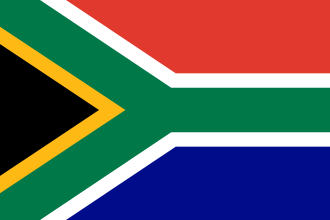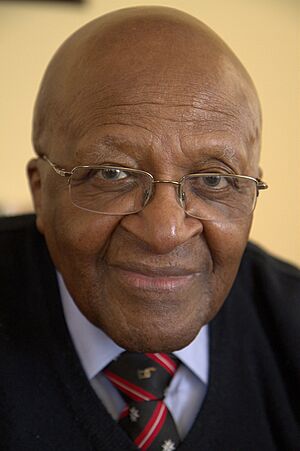Day of Reconciliation facts for kids
Quick facts for kids Day of Reconciliation |
|
|---|---|

The National flag largely represents peace and unity.
|
|
| Also called | Reconciliation day |
| Observed by | Republic of South Africa |
| Date | 16 December |
| First time | 16 December 1995 |
| Related to | Day of the Vow |
The Day of Reconciliation is a special public holiday in South Africa. It happens every year on December 16th. This holiday started in 1995, after the end of apartheid. Its main goal is to help people in the country come together and find peace.
The date, December 16th, was chosen because it was important to both Afrikaner and African cultures. The government wanted to pick a day that meant something to everyone. This was to help create harmony between different racial groups. On this day, people remember history, honor veterans, and have parades and other fun events.
For Afrikaners, this date was known as the Day of the Vow. It celebrated a victory by the Voortrekkers over the Zulus in a battle long ago. For African people, December 16th was also important. It marked peaceful protests against racial injustice. It was also the day the Umkhonto we Sizwe group was formed in 1961. This group was the armed part of the African National Congress (ANC).
Nelson Mandela and the South African Truth and Reconciliation Commission chose this date. They wanted a day that was special to both groups. This helped them work on healing the pain caused by apartheid.
Contents
When is Reconciliation Day?
The Day of Reconciliation became a public holiday for the first time in 1995. The new government wanted to show national unity. They picked a date that was meaningful for both Afrikaners and those who fought for freedom.
On this day, different cultural groups take part in parades. Many celebrations happen all over South Africa. In 2013, a statue of Nelson Mandela was revealed in Pretoria. He was South Africa's first black president. In 2009, President Jacob Zuma honored forgotten heroes of South Africa. He added about 100 names of dead veterans to the Wall of Names at Freedom Park.
In 2001, the African National Congress (ANC) remembered a police raid. This raid led to the famous Rivonia Trial. Some communities also do a walk to remember Mandela. Other parts of South Africa focus on the need for racial harmony in their areas.
Each year, the holiday has a different theme. For example:
- 2013: Nation Building, Social Cohesion, and Reconciliation.
- 2014: Social Cohesion, Reconciliation, and National Unity in 20 Years of Democracy.
- 2015: Bridging the Divide: Building a common South African nationhood.
- 2016: Bridging The Divide Towards A Non-Racist Society.
- 2017: The Year of OR Tambo: Reconciliation through big changes in society and economy.
- 2018: The Year of Nelson Mandela and Albertina Sisulu: Leaders for Reconciliation.
- 2019: The Year of Indigenous Languages: Helping reconciliation by promoting old languages.
Why is this day special?
Afrikaner History on December 16th
For Afrikaners, December 16th was known as the Day of the Vow. It was also called Day of the Covenant or Dingaan's dag. This was a religious holiday. It celebrated the Voortrekker victory over the Zulus at the Battle of Blood River in 1838. Some Afrikaners still celebrate it today.
On that day, 470 Voortrekkers were attacked by Zulu warriors. The Zulus had thousands of fighters. The Voortrekkers won, and about 3,000 Zulu warriors were killed. This event became a very important moment for Afrikaner nationalism, culture, and identity.
Many Afrikaners believed their victory was a gift from the God of Christianity. In 1864, a church group decided December 16th should be a day of thanks. Later, in 1894, Dingane's Day became a public holiday in the Free State.
During the Apartheid era, December 16th was still celebrated as the Day of the Vow. In 1952, its name changed to Day of the Covenant. In 1980, it became The Day of the Vow. The Voortrekker Monument in Pretoria was built on December 16th, 1949, to remember Dingane's Day.
The last time South Africa celebrated the Day of the Vow was in 1994. For Afrikaners, changing it to the Day of Reconciliation brought mixed feelings.
African History on December 16th
Africans who could not vote after the South African War protested racial discrimination on December 16th, 1910. More protests against racial discrimination continued on this date. In 1929, 1930, and 1934, anti-pass demonstrations were held by the Communist Party of South Africa (CPSA). The All African Convention (AAC) also met around this time in 1935.
Later, peaceful protests against apartheid were not working. So, the African National Congress (ANC) decided to form a military group. This decision came after the ANC was banned by the government. Nelson Mandela felt that non-violent resistance was not stopping Apartheid. He supported acts of sabotage.
December 16th is the anniversary of the 1961 founding of Umkhonto we Sizwe. This name means "Spear of the Nation" or MK. It was the armed part of the ANC. On that day, Umkhonto we Sizwe carried out its first acts of sabotage. They set off bombs at government buildings in Johannesburg, Port Elizabeth, and Durban. Also on December 16th, 1961, Umkhonto we Sizwe handed out flyers. These flyers explained that the group would fight for freedom and democracy in new ways.
The Day of Reconciliation is Born

When Apartheid ended, it was decided to keep December 16th as a public holiday. But its new purpose was to encourage "reconciliation and national unity." The government created it in 1994. Nelson Mandela was one of the leaders who helped start the idea for this holiday.
The first celebration of the Day of Reconciliation happened on December 16th, 1995. The first meeting of the South African Truth and Reconciliation Commission also took place on this day. In 1995, Archbishop Desmond Tutu said the holiday was for healing the pain of Apartheid.
The holiday also celebrates minority cultural groups in South Africa. This includes the San people. South African President, Jacob Zuma, said in 2009 that the holiday also promotes "non-sexism." This means treating all genders equally.
Other important things about this day
December 16th is also the sixteenth day of the South African summer holiday period. It is the first of four public holidays during the summer. The others are Christmas Day, Day of Goodwill, and New Year's Day. Many small businesses close, and people go on vacation during this time.
See also
In Spanish: Día de la Reconciliación para niños
 | Janet Taylor Pickett |
 | Synthia Saint James |
 | Howardena Pindell |
 | Faith Ringgold |

